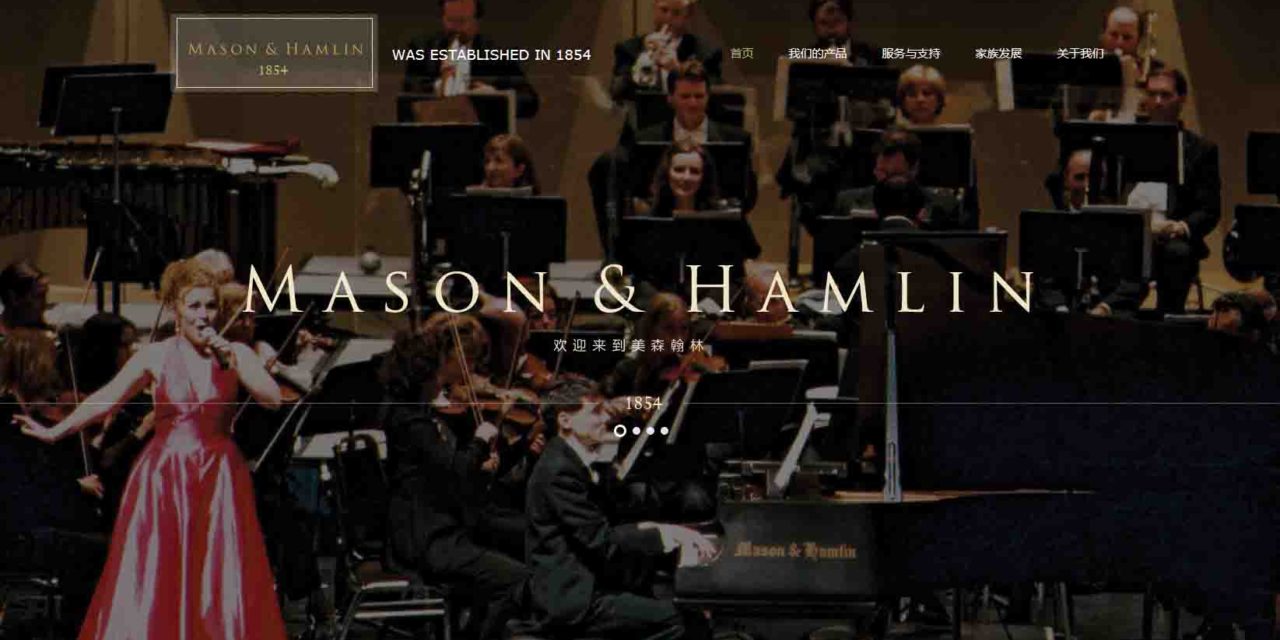The company that acquired Mason & Hamlin’s trademark in China has also appropriated most of its website content directly from the U.S. manufacturer’s site.
BARRIERS TO WORLD TRADE have been a hot topic in the news. Debate over disruptive, dubiously targeted, unsettled policy and “easy to win” trade wars is being shaped by the real costs of unintended consequences. But within the music products industry, at least, fair access to Chinese markets and respect for intellectual property in China may be two issues inspiring rare unanimity. On the IP front, horror stories abound in all sectors, and each flagrant abuse seems to draw attention to another, even more brazen. One victim, Mason & Hamlin, is particularly emblematic as a quintessentially American brand. With its factory in Haverhill, Massachusetts, Mason & Hamlin is one of only three companies still making pianos in the U.S., and the only one that manufactures here exclusively.
Founded in Boston in 1854 by Henry Mason, Mason & Hamlin began producing pianos in 1883. In 1906 the company patented the Tension Resonator, a system comprising a hub and steel truss rods attached to the inner rim that enhances the instrument’s strength and rigidity, preserves its structural integrity, and reduces flattening stress on the soundboard’s crown. Brothers Gary and Kirk Burgett revived the brand in 1996, and it is currently run by Kirk Burgett, who also owns the PianoDisc player piano and Wessell, Nickel & Gross (WNG) piano action brands. Over the years, Mason & Hamlin’s unique design features, quality manufacture, and purely American provenance have burnished a trademark that is respected worldwide.
With equal parts astonishment and disgust,
Mason & Hamlin spotted
a Chinese-made “Kirk & Burgt” piano,
whose brand audaciously
invokes the name of Mason & Hamlin’s CEO.
Or maybe not quite worldwide, as the company’s management was dismayed to learn in 2006, the first year it exhibited at the Music China trade show. It was on the Music China show floor that they discovered that another exhibitor—a Chinese flute maker—had registered the Mason & Hamlin trademark in China a year or two earlier. The offender contracted with two factories in Guangdong to make fake Mason & Hamlin pianos, and it maintains a sales office in Fujian. Much of the content on its website has been copied directly from the Mason & Hamlin site and translated into Chinese. It has also registered Henry Hamlin and Mason & Emmons trademarks and produces different piano lines under those names, both copying American-made Mason & Hamlin instruments.
With equal parts astonishment and disgust, Burgett and Mason & Hamlin Executive Vice President Tom Lagomarsino later spotted a Chinese-made “Kirk & Burgt” piano, whose brand audaciously invokes the name of Mason & Hamlin’s CEO. Made by yet another Chinese company, the instrument’s stencil aped Mason & Hamlin’s classic script logo font, and it was equipped with a counterfeit WNG piano action and an authentic, American-made PianoDisc player system.
Over the years, Mason & Hamlin has exhaustively petitioned the Chinese government through legal channels to reclaim exclusive ownership of its trademark. It has also exhaustively negotiated to buy back its trademark from the current Chinese mark holder but ultimately balked at the cost. “We thought the eight-figure price tag [in U.S. dollars] was a little much,” quips Lagomarsino. He adds that other music products companies in similar predicaments “have managed to pay a much lower ransom to get their trademark back.”
For many manufacturers, such outrages have been the price of doing business in China. Mason & Hamlin sells its American-made pianos in China under the Henry Mason name, and the company’s management acknowledges the rich opportunity the Chinese market represents for its Mason & Hamlin, PianoDisc, and Wessell, Nickel & Gross product lines. In 2017, Mason & Hamlin briefly explored forming a limited partnership with Grotrian Piano and its new owner, Parsons Music, but no agreement was reached and, as Lagomarsino stresses, “there are no co-products or shared designs of any type produced between the two companies.” All legitimate Mason & Hamlin instruments are still made exclusively by Mason & Hamlin in its own factory in Massachusetts.
Frustrated yet philosophical, Lagomarsino concludes, “China has a very different idea about intellectual property than the rest of the world. Their philosophies and laws on trademarks, patents, brand identities—and intellectual property and ownership in general—have caused a lot of grief for companies like Apple, as well as numerous well-known music products companies.” And despite Mason & Hamlin’s ongoing trademark struggles there, he expresses hope that “intellectual property rights in China will come around to the 21st century to recognize world intellectual property law standards and honor true historic trademark ownership.”

